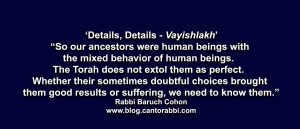DETAILS, DETAILS — “Vayishlakh” — Gen. 32-34 — by Rabbi Baruch Cohon
Some Torah narratives are broad and sweeping, as in “G-d created heaven and earth,” while others seem overcrowded with details. Such crowding fills some of the chapters in Genesis that make up these current weekly portions. This week we will read “Vayishlakh” in chapters 32-36, which explores the relations between Jacob’s family (our ancestors) and a local population called “Khivi” who lived in the part of Canaan where Jacob wanted to settle, a section with a city called Sh’khem. Maybe it was good grazing country where his flocks and herds could prosper. Apparently it had some rulers who could become his friends.
Looking around at the neighborhood and its people, Jacob’s only daughter, Dinah, decides to get away from all those brothers and go out and get acquainted with the local girls. Presumably she put on her good clothes and looked really beautiful, because she attracted the attention of not only the local girls but of the king’s son, Sh’khem, for whom the whole city was named. He proceeded to take her to his palace and rape her. Now stuck in captivity, she was missed at home, and Sh’khem wouldn’t let her go. In fact he was falling in love with her. He asks his father to arrange for her to become his wife. Now follows a succession of highly detailed accounts of Jacob’s glum reception of the news of his daughter’s defilement, his sons’ furious reaction, and the political negotiations between Sh’khem, his father Khamor and Jacob and his sons about how their tribes could live together and become one nation. Khamor makes a huge offer: The land is wide, use it, and live in the city, take our daughters for your wives and we will take your daughters into our families and we will all be one nation! And Sh’khem insists: I really love Dinah, so just tell me what to pay…etc.
To all of which, Jacob’s sons answer “b’mirmah” — in deceit, says the Torah. They convince the prince and his father to get all their male subjects circumcised, otherwise the sons of Jacob cannot give their sister to a man with a foreskin. But on the third day after the mass operation, Jacob’s sons invade the city, kill the men who are all still in pain, and plunder the flocks and herds. Jacob angrily charges his sons with exposing him — and themselves — to the revenge of the inhabitants of Canaan. They retort: “Shall he treat our sister like a whore?” They bring Dinah home, of course, but conflict and oppression result.
Certainly conflict and oppression came our way from other causes too. Why does the Torah recount this cause in such detail?
We might ask the same question about the story in last week’s reading, which describes every action our father Jacob took to acquire a fortune in livestock from his employer and father-in-law Lavan. In fact he tricked Lavan by agreeing to take only the speckled and spotted animals, leaving Lavan all those with solid color skins. Then he made sure the breeding animals saw the sticks he planted by the water — sticks with their bark sliced off here and there so they looked speckled and spotted. As a result, all the new animals were born — guess how their skins were? — speckled and spotted.
And what about the beloved Rachel? Didn’t she steal her father Lavan’s idols and hide them under the camel’s saddle?
So our ancestors were human beings with the mixed behavior of human beings. The Torah does not extol them as perfect. Whether their sometimes doubtful choices brought them good results or suffering, we need to know them. We can learn from their experiences. We do not pray to Abraham or Isaac or Jacob as saints. We pray to the G-d of Abraham, the G-d of Isaac, the G-d of Jacob. The G-d who blessed them and corrected their mistakes, the G-d who rewarded their righteous actions, the G-d who promised them the land that they — and their descendants today — inherited and fight for.
Every detail of these narratives can be a military “detail” with a job to do. We need to let it do its job.



